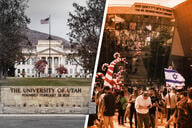You have /5 articles left.
Sign up for a free account or log in.
It’s a story that has become all too familiar on college campuses: students see buildings, classrooms or bulletin boards papered with racist or anti-Semitic fliers. The administration sends an email to students, telling them that the institution does not support these viewpoints and is investigating the matter.
The Anti-Defamation League tracked 188 incidents of white supremacist fliers on 129 campuses between September 2016 and September 2017. Using different metrics in a log last updated in mid-October, the Southern Poverty Law Center tracked 329 flier incidents on 241 college campuses since March 2016.
While the recent emboldening of white supremacist groups has been vexing to many on college campuses, especially in the last year or so, Oberlin College recently decided to change tactics.
Last month, fliers calling for the end of “Jewish privilege” were found plastered around campus. The college has since enacted a policy of no longer sending out email notifications for such incidents in most cases.
“We don’t want to participate in amplifying their voice,” Oberlin President Carmen Ambar said. “If the goal here is to be a provocateur, to manipulate, then we’re not going to give them a microphone.”
Oberlin has had its brushes with racist, white supremacist and anti-Islam fliers in the past, but Ambar said October’s event was the first under her tenure, which started in May.
The college still plans on investigating instances of hateful fliers being posted, and plans on alerting students if there is a suspected larger pattern, or if the fliers' presence leads to the suspicions of imminent danger. But the standard practice of notifying students for every instance is gone, and Ambar hopes that Oberlin’s adjustment in strategy will effectively neuter the aims of those who post fliers. The previous policy of alerting students was doing more harm than good, she said.
But while Ambar hopes the policy is a way of strategically adjusting to the times, not everyone on campus is on board. An editorial in The Oberlin Review questioned the policy, with the editorial board worrying that new policy would be akin to sweeping instances of hate under the rug, leaving students in the dark:
First and foremost, we believe that marginalized students have a right to be informed about any [and] all possible statements of hate and threats made against them. The decision to not inform students of such events in absence of “an ongoing pattern or a serious threat to campus safety” not only interferes with that right, but also parallels the fact that atrocities against Jews have historically been ignored and disbelieved -- even unreported.
The editorial further argued that a lack of response might lead to more confusion, since there would be an information gap between students who would see racist fliers before they are taken down and those who wouldn’t. It also questioned the practice of remaining silent in the face of racism.
“If students notice future hateful postings without prompt response from the administration, such news is likely to spread easily on Oberlin’s small and connected campus, and there is no way to know how accurately such information will travel through the Oberlin telephone,” the editorial board wrote. “When marginalized students do hear about acts of hate perpetrated against them, they want real solidarity from campus officials, including and beyond affirmation of their experiences and perceived danger. Ambar’s decision to limit information regarding acts of hate inherently means that solidarity will not be shown.”
Ambar said that she recognized the arguments laid out by some students, but emphasized that the new approach was the best option.
“I appreciate that concern,” the president said, adding that some students have expressed support for the new policy. She also said that Oberlin’s particular deep-seated liberal history is evidence that fliers there are less about recruiting and more about shock value. Perhaps the approach wouldn’t work for all campuses, she said, but it is the right approach at Oberlin.
“The question is, if it’s not a pattern or practice, and there’s not a safety or security issue, should a notice come out from the president’s office to the entire [Oberlin] student body?” Ambar said. “I think that we can find the right balance.”




